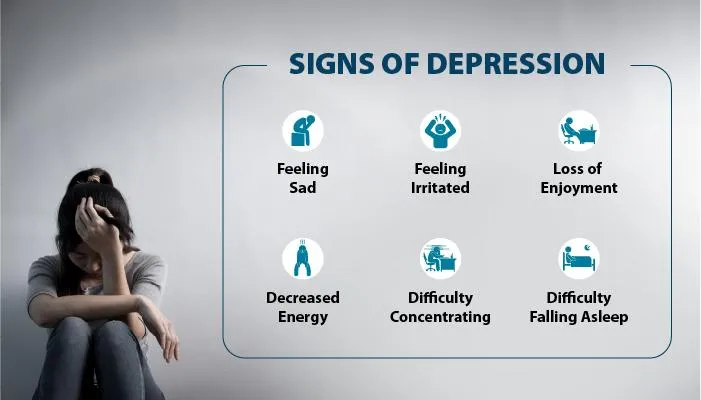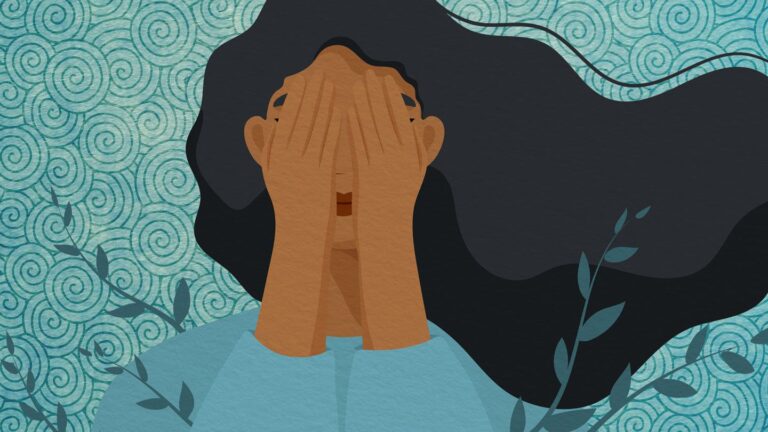Depression is more than just occasional sadness or a temporary low mood it’s a serious mental health condition that can affect how a person thinks, feels, and acts. For many, depression is a persistent and overwhelming experience that interferes with daily life, relationships, and work. The good news is that depression is treatable, and with the right support, recovery is possible.
This article explores the symptoms, causes, and types of depression, offering insights into how to identify and manage this condition.
Understanding Depression

Depression is a common mental health condition, affecting millions worldwide. While everyone feels sad or moody from time to time, depression is characterized by persistent feelings of sadness and a loss of interest in previously enjoyable activities.
In Australia, for instance, approximately one million people experience depression annually, with one in six women and one in eight men affected during their lifetimes. These statistics underscore the importance of recognizing depression and seeking timely help.
Symptoms of Depression
The symptoms of depression vary but typically impact a person’s emotions, thoughts, behaviors, and physical health. To be diagnosed with depression, these symptoms must persist for at least two weeks.
Emotional Symptoms
Persistent sadness, unhappiness, or irritability
Feelings of guilt, worthlessness, or hopelessness
Frustration or low self-confidence
Overwhelming feelings of disappointment
Cognitive Symptoms
Thoughts of being a failure or feeling life is not worth living
Pessimistic thoughts like “Nothing good ever happens to me.”
Trouble concentrating or making decisions
Suicidal thoughts
Behavioral Symptoms
Withdrawing from family, friends, or social activities
Avoiding hobbies or interests
Reduced productivity at work or school
Increased reliance on alcohol or sedatives
Physical Symptoms
Fatigue or feeling “run down.”
Frequent headaches or muscle aches
Sleep disturbances, including insomnia or excessive sleep
Changes in appetite, leading to weight gain or loss
Causes of Depression
The causes of depression are multifaceted and vary from person to person. Generally, depression arises from a combination of biological, psychological, and environmental factors.
Biological Causes
Genetic factors: A family history of depression increases the risk, but it doesn’t guarantee a person will develop it
Brain chemistry: Imbalances in neurotransmitters like serotonin and noradrenaline can contribute to depression
Medical conditions: Chronic illnesses or severe medical conditions can trigger depression
Psychological Causes
Personality traits such as low self-esteem, perfectionism, or sensitivity to criticism can increase susceptibility
A tendency toward self-critical or negative thinking patterns
Environmental Causes
Prolonged stress, such as unemployment or a toxic relationship
Life events, such as divorce, bereavement, or financial difficulties
Social isolation or lack of a supportive network
Lifestyle and Substance Use
Drug and alcohol misuse can both result from and contribute to depression
Poor sleep habits or an unhealthy diet may exacerbate symptoms
Types of Depression
Depression manifests in several forms, ranging from mild to severe. Understanding the different types helps in identifying the appropriate treatment.
Major Depression
Persistent and severe low mood, loss of interest in activities, and difficulty functioning daily
Melancholia
A severe form of depression with significant physical symptoms, such as slowed movements
Dysthymia (Persistent Depressive Disorder)
A milder but longer-lasting form of depression that persists for two or more years
Psychotic Depression
Depression accompanied by delusions or hallucinations
Antenatal and Postnatal Depression
Depression occurring during pregnancy or within the first year after childbirth
Seasonal Affective Disorder (SAD)
Depression with a seasonal pattern, typically occurring in winter months
Bipolar Disorder
Alternating periods of depression and mania
Cyclothymic Disorder
Milder, chronic mood fluctuations that do not meet the criteria for bipolar disorder
Tips for Managing Depression
Stay Physically Active
Exercise releases endorphins, which can improve mood and reduce stress
Seek Social Support
Talking to trusted friends or joining support groups reduces feelings of isolation
Maintain a Routine
Structure in daily life can help reduce feelings of chaos and provide a sense of stability
Practice Relaxation
Mindfulness, yoga, or meditation can alleviate stress and improve emotional well-being
Avoid Alcohol and Drugs
Substance use can worsen symptoms and interfere with treatment
Set Small Goals
Break tasks into manageable steps to build a sense of accomplishment and momentum
When to Seek Help
Depression often goes unrecognized, prolonging its impact on a person’s life. If symptoms persist for more than two weeks or interfere with daily functioning, seeking help from a healthcare provider is crucial. Untreated depression can lead to severe consequences, including relationship breakdowns, job loss, and increased risk of self-harm.
Authentic US Sources for Further Information
National Institute on Aging: www.nia.nih.gov
Mental Health America (MHA): www.mhanational.org
American Foundation for Suicide Prevention (AFSP): www.afsp.org
National Center for Complementary and Integrative Health (NCCIH): www.nccih.nih.gov
Vibrant Emotional Health: www.vibrant.org
Conclusion
Depression is a complex and multifaceted condition, but it is also highly treatable. Recognizing the symptoms and understanding the causes and types of depression can empower individuals to seek help and explore effective treatment options.
If you or someone you know is struggling with depression, reach out to a healthcare professional or trusted support system. Remember, you are not alone, and with the right resources, recovery is possible.


